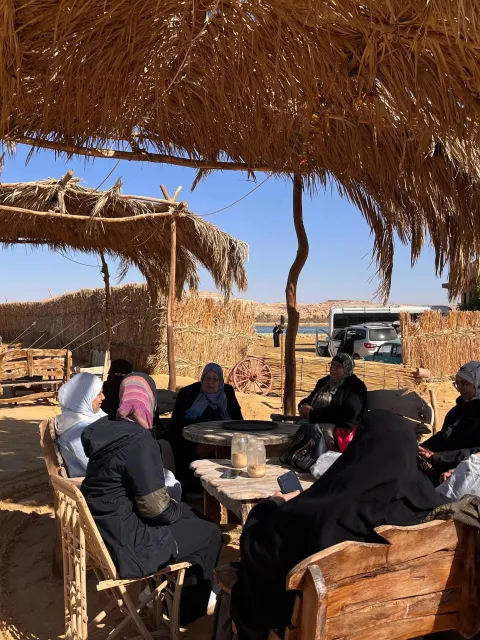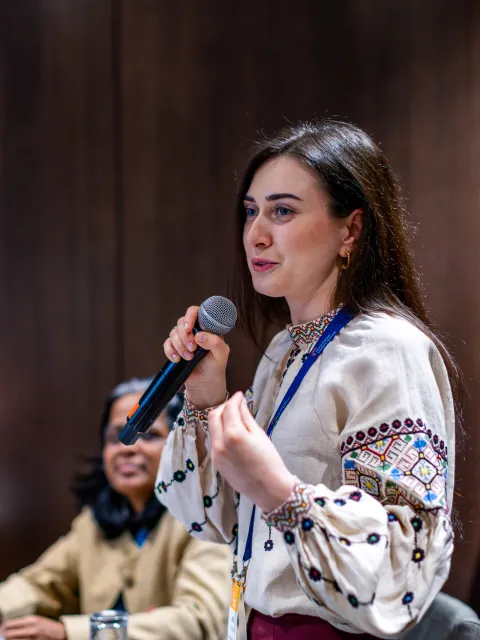Efforts to improve early cancer detection in low-resource settings: spotlight on lung cancer
Interviews with experts from Kenya and Egypt highlight efforts to improve early cancer detection in low-resource settings, emphasising the need for integrated approaches, public awareness, and advanced screening technologies, particularly for challenging cancers such as lung cancer.

Egypt and Kenya are among several countries in low-resource settings who are increasing their ability to detect cancers earlier, when they can be treated more successfully, including scans for lung cancer, a particularly challenging cancer to diagnose early.
HIGHLIGHTS
- Importance of early detection: Early detection of cancer significantly increases the chances of successful treatment and survival rates. Lung cancer is particularly challenging to detect early, but improvements are being made. For example, Egypt has integrated AI technology to analyse chest x-rays done in routine practice, identifying early-stage lung cancer more effectively.
- Global efforts in low-resource settings: Initiatives in countries like Kenya and Egypt, led by local cancer experts, focus on improving early detection through capacity building in healthcare, infrastructure enhancement, and public awareness campaigns.
- Challenges and technological advances: Both countries face significant challenges due to limited resources but are making strides with the use of advanced technologies like AI for better screening and diagnosis, particularly for lung cancer which lacks simple screening methods.
Detecting cancer early can sometimes mean the difference between life and death. When cancer is found early, while it is still small and localised, the chances of successful treatment dramatically increase. When it is found late, when it has grown or spread, treatment is often more invasive and expensive, and the chances of survival along with quality of life may drop significantly.
This is especially true for lung cancer. In the United States, for example, there has significant progress in detecting and treating many cancers early in the past 30 years. The overall 5-year survival rate for colon cancer is 65%; for breast cancer it's 90%. For lung cancer, however, only 16% of patients are diagnosed at an early stage, and the overall five-year survival rate is just 18%.
In Kenya, the International Cancer Institute (ICI), a UICC member organisation, is actively working to overcome these challenges. Professor Fredrick Chite Asirwa, a medical oncologist and CEO of ICI, stresses on the importance of integrated approaches to improve early detection in low- and middle-income countries (LMICs).
“We are focusing on capacity building among healthcare workers, improving infrastructure, and increasing public awareness about the importance of early detection. For instance, we have introduced mobile screening units to reach remote areas, providing access to essential diagnostic services that were previously unavailable.”
– Professor Fredrick Chite Asirwa
Dr Khaled Kamal, Chair of the Executive Committee for the Presidential Initiative for Cancer Screening and Early Detection in Egypt, highlights similar efforts in his country. “Our programme focuses on lung, colon, prostate, and cervical cancers, with efforts extending to awareness campaigns and capacity building within healthcare systems,” he explains.
Implementing effective screening programmes in low-resource settings faces numerous hurdles, such as infrastructure limitations and substantial resources in terms of equipment, testing kits, and trained personnel.
“The primary healthcare system lacks the capability to detect enough of these diseases at an early stage. This leads to a higher prevalence of advanced-stage cancers, stage four disease, which impacts our healthcare expenditure and the ability to treat patients with state-of-the-art methods. The challenges of implementing large-scale screening programmes for a population of over 100 million, as in Egypt, are compounded by the need to not only screen but also to build capacity, train staff, conduct research, and improve diagnostic procedures.”
– Dr Khaled Kamal
To address these challenges, Egypt’s initiative has implemented a digital questionnaire for citizens over 18, assessing risk factors and directing eligible individuals to appropriate screening facilities. Continuous training for healthcare professionals and the digitalisation of the screening process are critical components of this programme. Dr Kamal notes, “We promote this questionnaire in primary healthcare facilities, through social media, and a call centre. This process helps identify individuals at risk and refers them for further testing.”
Kenya is also taking steps to improve its early detection capabilities. Prof. Chite emphasises the importance of community engagement and education, as well as training community health volunteers to educate the public about cancer symptoms and the importance of screening and early detection.
“In 2012, we were only six cancer specialist doctors in the entire country, and the country has 55 million people. We were overwhelmed. I used to see 100 to 150 cancer patients a day. Now we've trained so many that we are close to 100 in the country now, which is still not enough, and most of them are in urban areas, but it is a huge step forward.”
– Professor Fredrick Chite Asirwa
Lung cancer remains particularly difficult to detect early due to the lack of simple and cost-effective screening methods. “We do not have a simple, easy screening methodology for lung cancer. It needs more infrastructure and the training is more cumbersome,” says Dr Kamal. The primary screening tool, low-dose CT scans, requires significant infrastructure and training. Additionally, smoking populations, which are at higher risk, often face stigma and may be less likely to seek screening.
To face these challenges, Egypt has focused its criteria for lung cancer screening to include all smokers (users of cigarettes and other tobacco products), people who have recently quit, in combination with other high-risk factors.
“We focus on all smoking populations because we need to detect them at an early stage,” explains Dr Kamal. “It is very important for us to detect lung cancer early due to the availability of new treatments that significantly improve survival rates.”
Recent advancements in treatment, such as new drugs that significantly improve survival rates for metastatic lung cancer, underscore the importance of early detection. Egypt’s programme has also integrated AI technology to analyse chest x-rays done in routine practice, identifying early-stage lung cancer more effectively.
“We have incorporated AI programmes to revise scans routinely done in chest hospitals, as our surgeons noticed an increased rate of early-stage lung cancer cases detected during the COVID era due to the increased use of CT scans.”
– Dr Khaled Kamal
Dr Kamal also highlights the importance of public awareness and smoking cessation programmes. “We trained primary healthcare physicians and social workers to deliver messages about smoking cessation. We promote more for smoking cessation programmes than focusing on decreasing the guilt feeling towards smoking,” he explains. Collaboration with chest or pulmonary hospitals, providing cardio-thoracic services, ensures that individuals with other pulmonary conditions receive appropriate care, further supporting the overall goal of improving lung health.
In Kenya, similar strides are being made. “We are exploring the use of AI to assist in diagnosing cancers from imaging results,” says Prof. Chite. “This technology can help bridge the gap in specialist radiologists and provide more accurate diagnoses”.
Prof. Chite also echoes the need for public awareness in Kenya. “Community outreach and education campaigns are crucial. We need to dispel myths and reduce the stigma associated with cancer,” he says. “By increasing awareness, we can encourage more people to participate in screening programmes and seek medical help early. We also need to work on linkages to care, so that all those that seek care are appropriately managed through effective and efficient referral systems”.
Integrated approaches, improved infrastructure, and continuous training for healthcare professionals are vital in overcoming the barriers to early cancer detection. With sustained efforts and international support, these initiatives can significantly impact cancer outcomes in low- and middle-income countries.
The topic of early detection and lung cancer feature prominently at the upcoming World Cancer Congress, 17-19 September, which can be attended in person in Geneva or remotely. Consult the programme.
Last update
Monday 07 October 2024




